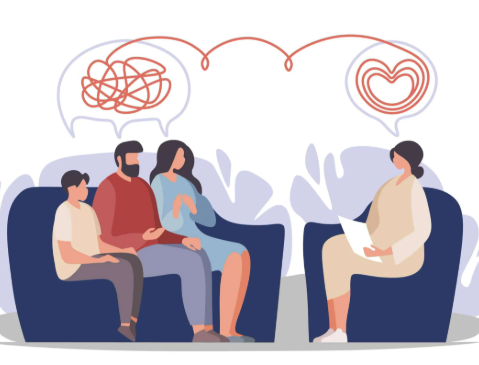Family relationships are among the most important connections we have in our lives, yet they can also be the most complex and challenging to navigate. Every family experiences ups and downs, disagreements, and periods of stress. However, there comes a time when these challenges may require professional support to work through effectively.
At Hera Therapy, we understand that recognizing when your family could benefit from counseling isn’t always straightforward. Many families wonder whether their struggles are “normal” or if they’ve reached a point where outside help would be valuable. The truth is, family counseling isn’t just for families in crisis—it’s a proactive tool that can strengthen relationships, improve communication, and create healthier family dynamics.
Also Read: Words That Heal: Powerful Mental Health Quotes for Kenyans
7 Signs Your Family Could Benefit From Professional Support
Here are seven key signs that indicate your family could benefit from professional counseling support.
1. Communication Has Broken Down or Become Consistently Negative
One of the clearest indicators that family counseling could help is when communication patterns have become destructive or have stopped altogether. This might manifest as family members who no longer talk to each other about meaningful issues, conversations that quickly escalate into arguments, or interactions characterized by criticism, defensiveness, or contempt.
When family members feel unheard, misunderstood, or constantly criticized, they often withdraw or become reactive. You might notice that discussions about even minor topics turn into major conflicts, or that certain subjects have become completely off-limits because they always lead to fights. Perhaps family members are walking on eggshells around each other, or some have stopped trying to communicate their needs entirely.
Healthy communication is the foundation of strong family relationships. A family therapist can help identify harmful communication patterns and teach family members new skills for expressing themselves clearly, listening actively, and resolving conflicts constructively.
2. Major Life Changes or Transitions Are Creating Stress
Significant life changes, even positive ones, can create stress that impacts the entire family system. These transitions might include divorce or separation, remarriage and blending families, the birth of a new baby, a teenager leaving for college, job loss or career changes, relocation to a new city, serious illness or death of a family member, or retirement.
During these periods, family roles and routines often shift dramatically. What worked before may no longer be effective, and family members may struggle to adapt to their new circumstances. Some family members might handle change better than others, creating imbalance and tension within the family unit.
Family counseling during transitions can provide a supportive space to process emotions, develop new coping strategies, and establish healthy patterns that work for the family’s current situation. A therapist can help family members understand that their feelings about change are normal while guiding them toward positive adaptation.
3. Behavioral Issues Are Affecting Family Harmony
When one or more family members are exhibiting concerning behaviors that impact the entire family, it may be time to seek professional support. These behaviors might include a child or teenager acting out at home or school, substance use issues, aggressive or violent behavior, withdrawal and isolation from family activities, risky or self-destructive behaviors, or persistent defiance of family rules and boundaries.
It’s important to understand that behavioral issues often reflect underlying emotional needs or family system problems rather than simply being “bad” behavior. A child who is acting out may be responding to stress, trauma, or feeling disconnected from the family. An adolescent who is withdrawing might be struggling with identity issues or mental health concerns.
Family therapy can help identify the root causes of behavioral problems and develop comprehensive strategies that address both the individual’s needs and the family dynamics that may be contributing to the issues.
4. There’s a Lack of Emotional Connection or Intimacy
Families naturally go through periods where they feel more or less connected, but when emotional distance becomes the norm, it can indicate a need for professional support. Signs of decreased emotional connection might include family members spending most of their time in separate spaces, lack of meaningful conversations or shared activities, absence of physical affection or expressions of care, or feeling like you’re living with strangers rather than family members.
This emotional disconnect can happen gradually, often as family members become busy with work, school, and individual activities. However, when families lose their sense of closeness and support, it can lead to feelings of loneliness, resentment, and disconnection that affect everyone’s wellbeing.
Family counseling can help family members reconnect by creating structured opportunities for meaningful interaction, teaching skills for emotional expression and empathy, and identifying barriers to intimacy that can be addressed.
5. Recurring Conflicts Remain Unresolved
Every family has disagreements, but when the same conflicts arise repeatedly without resolution, it indicates that the family may need help developing better problem-solving skills. These recurring conflicts might center around household responsibilities and chores, screen time and technology use, curfews and rules for teenagers, financial decisions and spending, disciplinary approaches for children, or relationships with extended family members.
When families get stuck in cycles of unresolved conflict, it often means they lack the tools or skills needed to work through their differences effectively. Family members may have different conflict styles—some might avoid confrontation while others become aggressive—making it difficult to find common ground.
A family therapist can teach conflict resolution skills, help family members understand each other’s perspectives, and guide the family toward collaborative problem-solving approaches that work for everyone involved.
6. Mental Health Issues Are Impacting the Family
When one or more family members are struggling with mental health concerns, it affects the entire family system. These concerns might include depression or anxiety in a parent or child, eating disorders, attention deficit hyperactivity disorder (ADHD), trauma responses following a difficult experience, obsessive-compulsive disorder (OCD), or other mental health conditions.
Mental health issues can change family dynamics significantly. Other family members may not understand what their loved one is experiencing, leading to frustration or conflict. They might also take on additional responsibilities or worry constantly about their family member’s wellbeing. Sometimes, families develop unhealthy patterns around mental health issues, such as enabling behaviors or avoiding discussing the problem altogether.
Family therapy can provide education about mental health conditions, help family members develop healthy ways to support their loved one, and ensure that everyone’s needs are being addressed within the family system.
7. You Feel Stuck and Don’t Know How to Move Forward
Sometimes families reach a point where they recognize that things aren’t working well, but they feel completely stuck and don’t know how to create positive change. This might manifest as a sense that problems are too overwhelming to address, previous attempts to improve things haven’t worked, feeling like the family is just going through the motions, uncertainty about where to start making changes.
This feeling of being stuck often indicates that the family has exhausted their current resources and coping strategies. They may have tried various approaches on their own but haven’t been able to create lasting change. This is actually a very common experience and a clear sign that professional support could be extremely beneficial.
Family therapists are trained to help families identify patterns, set achievable goals, and develop step-by-step plans for creating positive change. They bring an outside perspective that can help families see solutions they might not have considered on their own.
The Benefits of Family Counseling
Family counseling offers numerous benefits that extend far beyond addressing immediate problems. Through the therapeutic process, families often experience improved communication skills that serve them throughout their lives, stronger emotional bonds and increased intimacy, better conflict resolution abilities, increased understanding and empathy between family members, development of healthy boundaries and roles, enhanced problem-solving skills, and greater resilience during future challenges.
It’s important to understand that family counseling isn’t about assigning blame or determining who is “right” or “wrong.” Instead, it focuses on understanding how family members interact with each other and identifying ways to create healthier, more supportive relationships.
Taking the First Step
Recognizing that your family could benefit from counseling is an important first step, but it can also feel overwhelming. Many families worry about what therapy will be like or whether family members will be willing to participate. These concerns are completely normal and valid.
At Hera Therapy, we understand that reaching out for support can feel vulnerable. Our experienced family therapists create a warm, non-judgmental environment where all family members feel safe to express themselves and work toward positive change. We tailor our approach to each family’s unique needs, cultural background, and goals.
Remember that seeking family counseling is actually a sign of strength and commitment to your family’s wellbeing. It demonstrates that you value your relationships enough to invest in making them stronger and healthier.
Moving Forward Together
Family relationships are worth investing in. They provide us with our first lessons about love, communication, and connection, and they continue to influence our wellbeing throughout our lives. When families are functioning well, they serve as a source of support, comfort, and joy for all members.
If you recognize any of these seven signs in your own family, consider reaching out to explore how family counseling might help. Early intervention often leads to better outcomes and can prevent minor issues from becoming major problems.
At Hera Therapy, we’re here to support your family’s journey toward healthier relationships and improved communication. Every family deserves to experience the joy and connection that comes from strong, supportive relationships, and we’re honored to help families achieve that goal.
Taking the step to seek family counseling is an investment in your family’s future—one that can create positive changes that last for generations to come.
Ready to Strengthen Your Family’s Bond?
If any of these signs resonate with your family’s experience, you don’t have to navigate these challenges alone. At Hera Therapy, our compassionate family therapists are here to help your family rediscover connection, improve communication, and build the strong, supportive relationships you deserve.
Take the first step today:
- Schedule a consultation to discuss your family’s unique needs and goals
Don’t wait for problems to escalate. The sooner you reach out, the sooner your family can begin building healthier patterns and deeper connections. Your family’s wellbeing is worth the investment, and we’re here to support you every step of the way.
Contact Hera Therapy today and take the first step toward a stronger, more connected family tomorrow.

